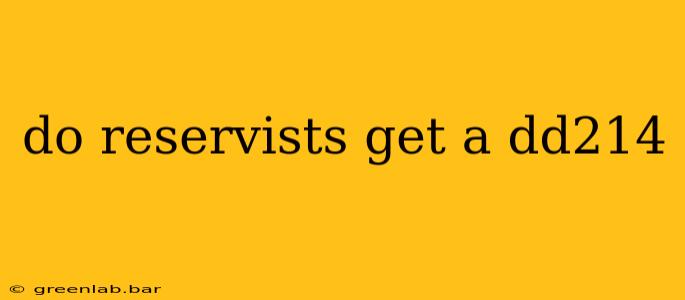The question of whether reservists receive a DD Form 214, Certificate of Release or Discharge from Active Duty, is a common one, and the answer isn't a simple yes or no. It depends on the circumstances of their separation from service. Let's break down the different scenarios and clarify the documentation reservists receive.
What is a DD214?
Before diving into the specifics for reservists, let's briefly define the DD214. This form is a crucial document for any service member separating from the military. It serves as official proof of their service, including dates of service, rank attained, decorations and awards received, combat experience, and more. It's vital for accessing veterans' benefits, employment opportunities, and other services.
DD214 for Reservists: The Nuances
Reservists don't automatically receive a DD214 upon completing their initial contract or even after many years of service. The key factor determining whether a reservist receives a DD214 is the type of separation from the Reserves.
Scenarios Where Reservists Receive a DD214:
-
Honorable Discharge: If a reservist is honorably discharged from the Reserves, they will receive a DD214. This typically occurs at the end of their obligated service, or if they are medically separated or discharged for other reasons deemed honorable.
-
Other than Honorable Conditions: Even if the separation isn't honorable, a DD214 will still be issued, detailing the reason for the discharge. This is important to note because while this document reflects the nature of their separation, it is still an official record of their military service.
-
Retirement: Reservists who retire from the Reserves after serving a specified period (usually 20 years or more) will receive a DD214 reflecting their retirement status and service history.
Scenarios Where Reservists May Not Receive a DD214:
-
Transfer to Inactive Ready Reserve (IRR): Many reservists transition to the IRR after completing their initial service obligation. This is not a separation from service, but rather a change in status. Therefore, they do not receive a DD214 at this point. They remain in the Reserve Component, albeit in a less active role.
-
Completion of Initial Contract/Enlistment: Simply finishing your initial contract or enlistment period in the Reserves doesn't automatically trigger the issuance of a DD214. Again, this is unless you are subsequently honorably discharged, medically separated, or retire.
-
Resignation before fulfilling obligation: Individuals leaving the Reserves before their obligated service is complete often do not receive a DD214. The exact documentation and type of discharge will depend on the circumstances of their separation.
Obtaining Your Military Records
If you're a reservist and unsure about your separation documentation, or if you need a copy of your DD214, you should contact the National Archives and Records Administration (NARA). They maintain records for all branches of the military. You can also request your records through your respective branch's personnel office.
In summary: The issuance of a DD214 to a reservist is contingent upon the reason and type of separation from service. While not all departures from the Reserves result in a DD214, those separated under honorable conditions or through retirement will receive one. Understanding this distinction is crucial for reservists navigating their post-service transition.

